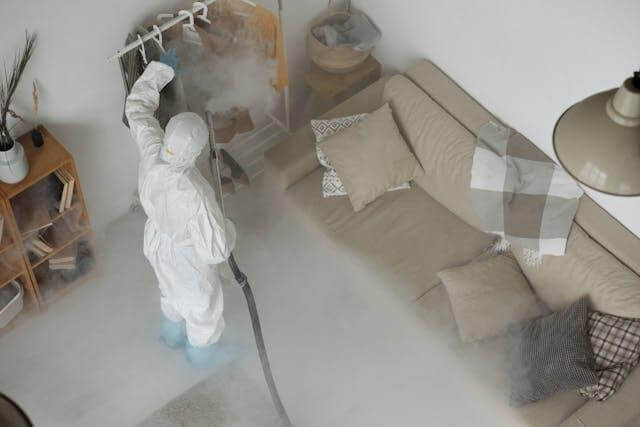TL;DR: Tips For Avoiding Pest Issues While Your Home Is On The Market
Pests can tank your home sale—fast. Even spotless homes attract them if you don’t clean, declutter, and seal up trouble spots. Take preventative steps early: inspect, store smart, and clean consistently. Bonus points for using low-toxic tools and getting a pest inspection before listing. Buyers notice everything—don’t let bugs be the reason you lose them. We will learn about tips for avoiding pest issues while your home is on the market.
Pests can quickly turn away interested buyers and cause closing delays. Even a clean home may attract them if small issues go unnoticed. Unsealed food, clutter, or standing water can be enough to trigger an infestation. Preventing these problems protects your home’s value and presentation. It’s important to take early action to avoid pest issues while your home is on the market.
Declutter and Clean to Keep Pests Away
Pests are drawn to cluttered, dark, and damp areas where they can hide undisturbed. To reduce those hiding spots, start by going through storage spaces such as closets, garages, and cabinets. Remove anything you’re not using, including old boxes, piles of paper, and unused items that collect dust. Focus on spaces behind appliances and under furniture.
Related Links
- The Impact Of Lawn Care And Pest Control On Home Resale Value
- Through The Eyes Of Jay Besheer – A History Of Gunter
- Pest Control 101: How To Remain Bug-Free
- How To Avoid Bed Bugs When You Travel
- How To Ensure A Pest-Free Transition When Moving To A New House
- How To Get Rid Of Mice In Your Storage Unit
There is a clear connection between clutter and pest infestations, especially in areas that remain undisturbed for long periods. Vacuum floors, sweep crumbs out of corners, and wipe kitchen surfaces with a mild cleaner. Pay special attention to baseboards and under sinks, where pests often enter or nest. Keeping your home consistently clean makes it less appealing to unwanted visitors and easier to maintain during showings.

Use Storage Strategically While Prepping Your Home
Clearing out excess items can make your home look larger and reduce pest risks. Boxes stacked in corners or closets often go untouched for months, creating perfect hiding spots for bugs or rodents. If you’re unsure what to do with extra furniture or seasonal items, consider the benefits of short-term storage. It gives you a secure place to keep belongings while your home is on the market and makes cleaning easier. Less clutter means fewer places for pests to hide—and a more spacious, appealing home for buyers to walk through.
Key Takeaways:
- Declutter & Deep Clean: Pests love clutter, crumbs, and damp spaces, especially behind appliances or under furniture.
- Seal Entry Points: Tiny gaps around doors, windows, pipes, and vents are open invitations. Seal them tight.
- Yard Matters Too: Overgrown shrubs, wood piles, and clogged gutters attract pests—keep your exterior clean.
- Smart Storage = Fewer Hiding Spots: Use off-site storage to reduce clutter and remove pest-friendly spaces.
- Daily Kitchen Habits Help: Airtight containers, regular trash removal, and clean counters keep critters at bay.
- Pet Food Is a Magnet: Store kibble in thick containers and never leave food out overnight.
- Low-Toxic Tools Work: Ultrasonic repellents, essential oils, and sticky traps are great alternatives to chemicals.
- Get a Pre-Listing Pest Inspection: It helps catch hidden problems and gives buyers peace of mind.
Don’t Let Small Gaps Become Big Problems
Even the tiniest openings can give pests easy access to your home. Begin by inspecting the outside perimeter, especially where plumbing and wiring enter the building. Use caulk or foam to seal any visible gaps, and install mesh covers over exterior vents and exhaust fans.
Inside, check around windows and doors. Weatherstripping helps close the space between frames and moving parts. For doors, add door sweeps to close off the gap at the bottom. Repair or replace any torn window screens. These steps don’t take long, but they block many of the common entry points pests use.
What to Fix in the Yard Before Buyers Visit
An unkempt yard can be more than a cosmetic issue—it often invites pests close to the home. Start by mowing the lawn and trimming plants that brush against the siding or windows. Remove piles of leaves, branches, or wood stacked near the foundation. These create natural shelters for rodents and insects.
Make sure your gutters are clear and draining properly. Standing water can attract mosquitoes, ants, and other pests. If your trash bins are stored outside, use lids that seal tightly and keep them a few feet away from any doors or windows. A clean exterior sets the tone for what buyers expect inside.
Get a Pest Inspection Before You List
Hiring a licensed pest control technician to inspect your home before listing is a smart move. A trained professional can check for termite damage, rodent droppings, insect activity, and signs of nesting that may go unnoticed. Catching and fixing these issues before buyers show up prevents unwanted surprises during the inspection.
If treatment is needed, schedule it immediately and ask for documentation once it’s complete. Many buyers want to see a pest clearance letter or confirmation of preventive services. Taking care of this early helps avoid pest issues while your home is on the market and increases buyer confidence.
Daily Food and Trash Habits That Prevent Infestations
Preventing pest problems often starts in the kitchen. Food and trash are the most common attractants, especially if they’re improperly handled.
To keep pests away:
- Wipe counters and stovetops after every meal
- Sweep floors often to eliminate crumbs
- Store dry food in airtight containers
- Rinse recyclables before putting them in bins
- Take out kitchen trash daily
- Keep garbage cans sealed with tight-fitting lids
- Avoid leaving fruit on the counter too long
These routines require little effort, but they do reduce the chance of infestations.

Low-Toxic Tools That Help Keep Pests Out
Harsh chemical sprays aren’t your only option. These safe, low-maintenance tools can support your pest prevention plan:
- Ultrasonic repellents: Plug them into outlets in garages or basements to deter rodents and insects
- Ant baits and sticky traps: Place behind appliances, near walls, or under cabinets to catch activity early
- Essential oil sprays: Use citrus, peppermint, or eucalyptus oils to repel bugs near windows and doors
- Vinegar-based cleaners: Clean kitchen surfaces and break up insect scent trails using diluted vinegar
- Mesh covers for vents: Keep bugs and mice from entering through exhaust fans or utility openings
These solutions are easy to use and safe for homes that are being shown frequently.
How to Avoid Pest Issues While Your Home Is on the Market
If you want to avoid pest issues while your home is on the market, take steps to prevent problems before they begin. Clean pet areas regularly, including food bowls and litter boxes. Store kibble in thick plastic or metal bins, not in its original packaging.
Inspect your home each week while it’s listed. Look for signs of droppings, chewing, or nesting. Fix small issues as they come up instead of waiting. In some cases, working with professional pest control in property value maintenance can help ensure long-term protection and keep your home in top condition. These habits show buyers the home is well cared for and save you from last-minute stress during inspections.

Pet Food Can Attract Unwanted Guests
Pet food, especially if left out overnight, is a strong attractant for pests. Set feeding times for your pets and remove uneaten food after meals. Use bowls that are easy to clean and wipe up any spills right away.
Store dry food in sealed containers, not bags or open bins. Many rodents can chew through thin packaging, so choose thicker storage that pests can’t penetrate. Also, avoid placing pet bowls near doorways or baseboards where pests can easily approach unnoticed.
Protect Your Sale by Staying Pest-Free
A well-maintained home creates a positive first impression and avoids problems during the selling process. Pest issues can damage that impression quickly. Buyers notice the smallest signs, whether it’s a stray ant in the kitchen or a stain under the sink. They may see those things as signs of bigger problems.
You don’t need to spend a lot on pest control, but you do need to stay consistent. If you want a smooth sale, take the time to avoid pest issues while your home is on the market. It’s a step that helps protect both your property and your sale.
FAQ: Tips For Avoiding Pest Issues While Your Home Is On The Market
Q: Why Is Decluttering Important For Pest Prevention?
A: Clutter creates hiding spots where pests can nest undisturbed. Cleaning and decluttering reduce those risks and make your home more appealing to buyers.
Q: What Should I Check Outside My Home To Prevent Pests?
A: Trim plants away from the house, clear yard debris, fix drainage issues, and tightly seal trash bins kept outdoors.
Q: Do I Really Need A Pest Inspection Before Selling?
A: Yes. A pre-listing inspection can identify unseen issues, help you fix them in advance, and provide documentation that reassures buyers.
Q: What Are Easy Daily Habits That Help Prevent Pests?
A: Clean up food spills, take out the trash daily, wipe kitchen surfaces, seal pantry items, and rinse recyclables before tossing them.
Q: Are There Safe, Non-Toxic Ways To Keep Pests Away?
A: Absolutely. Ultrasonic repellents, peppermint oil sprays, sticky traps, and vinegar-based cleaners are effective and home-showing-friendly.








